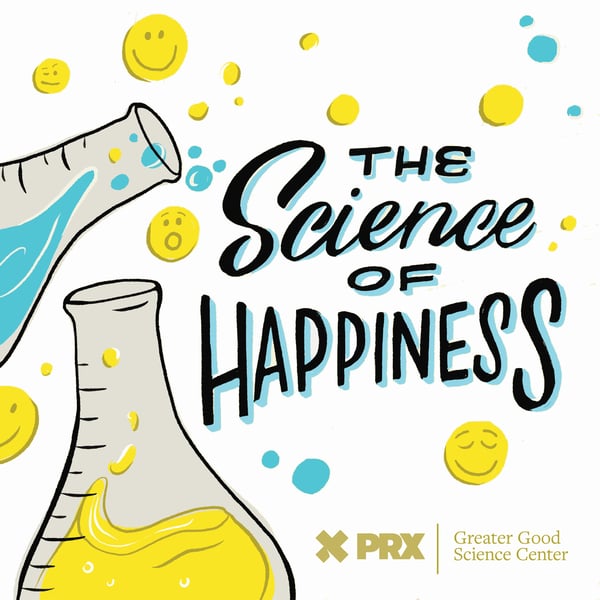Who’s Always There for You?
The Science of Happiness
PRX and Greater Good Science Center
4.4 • 1.9K Ratings
🗓️ 14 March 2024
⏱️ 18 minutes
🧾️ Download transcript
Summary
When we remember the times someone had our back, it changes the way we view ourselves and the world. Our guest explores what happens when trying a practice to feel more supported.
Link to episode transcript: https://tinyurl.com/mrpyr8a7
Episode summary:
Ever since he was a young child, José Valladares has spent his life caring for others and has taken pride in supporting his family and community, For our show, he tried a practice where he recalled people in his life who he can turn to during a difficult moment — the people who support him. As he wrote about their admirable qualities and specific instances where they helped him, José felt a renewed sense of gratitude and energy to persist forward in helping others. Later, we hear from psychologist Angela Rowe about how feeling supported can impact our relationships and sense of personal empowerment.
Practice:
Make a list of the people who offer you comfort or security.
Write down six positive qualities that are common to some or all of these people.
Next, recall and visualize a specific situation when you felt distressed or worried, and one of these people comforted and helped you.
Write a brief description of that situation and how you felt during it.
Learn more about this practice at Greater Good In Action:
https://ggia.berkeley.edu/practice/feeling_supported
Today’s guests:
José Valladares is a software engineer in Utah originally from Honduras.
Angela Rowe is a psychology professor at the University of Bristol.
Learn more about Angela’s work: https://tinyurl.com/4nh752ad
Resources from The Greater Good Science Center:
Happiness Break: Who Takes Care of You? With Dacher Keltner: https://tinyurl.com/bdezwwyd
How to Let Someone Love You (The Science of Happiness Podcast): https://tinyurl.com/5xtzbzj2
Four Ways Social Support Makes You More Resilient: https://tinyurl.com/2p9zkjpj
Just One Thing: Feel the Support: https://tinyurl.com/yrfnmwfv
Friend or Family? https://tinyurl.com/msbs2kuh
More Resources on Feeling Supported
NYT Times - Are You Anxious, Avoidant or Secure? https://tinyurl.com/yes746sv
The Atlantic - The Trait That ‘Super Friends’ Have in Common: https://tinyurl.com/bdheumdh
BBC - Why friendship makes us healthier: https://tinyurl.com/3596n4u7
TED - How to ask for help -- and get a "yes": https://tinyurl.com/2ybrmt7m
Stanford - Asking for help is hard, but people want to help more than we realize, Stanford scholar says’: https://tinyurl.com/4n4hraj5'
Who do you turn to for support in your life? Email us at [email protected] or use the hashtag #happinesspod.
Help us share The Science of Happiness!
Rate us on Spotify and share this link with someone who might like the show: https://tinyurl.com/b6779syt
Transcript
Click on a timestamp to play from that location
| 0:00.0 | My family couldn't afford a lot of things and that's the life that I had in Honduras, a very humble, poor situation. |
| 0:15.2 | We went days without having enough food, |
| 0:19.8 | we had to share, if we had three eggs, we have to share it with all of us. We were 10 children. I went to |
| 0:29.2 | public school down there. I started working when I was 12 years old to support and help my mom. |
| 0:37.0 | Later on, I came to the United States and I was able to get my green card and eventually I began a U.S. citizen. |
| 0:47.6 | And I moved here in West Valley City in Utah, but I consider myself the glue of the family, and I have always been in touch with all of them, and I keep an eye on all of them. |
| 1:02.0 | Back in my mind, I was thinking, I... keep an eye on all of them. |
| 1:03.2 | Back in my mind I was thinking, I don't need help. |
| 1:05.7 | I always the one that helped, but actually |
| 1:08.9 | is not always that way. |
| 1:11.6 | We all need help at one point or another. Welcome to the Science of Happiness. I'm Dacker Keltner. Today we're exploring a practice |
| 1:29.6 | that studies suggest can make us feel more supported, which in turn helps us act more |
| 1:34.8 | compassionately and altruistically. Our guest today Jose Valladares has spent his |
| 1:40.0 | whole life helping others, but he hadn't really thought much about who has been supporting |
| 1:44.6 | him over the years. And sometimes we need to do a little extra work to really take in what others |
| 1:51.4 | are doing for us. |
| 1:52.8 | That's where today's practice comes in. |
| 1:54.8 | It's called feeling supported. |
| 1:57.3 | Takes about 15 minutes to do, |
| 1:59.2 | and the literature suggests it's worth the time. |
| 2:01.8 | We hear from Jose about how it felt to reflect on his own support systems, |
| 2:05.6 | and later we'll hear from psychologist Angela Rowe about what feelings supported can do |
... |
Please login to see the full transcript.
Disclaimer: The podcast and artwork embedded on this page are from PRX and Greater Good Science Center, and are the property of its owner and not affiliated with or endorsed by Tapesearch.
Generated transcripts are the property of PRX and Greater Good Science Center and are distributed freely under the Fair Use doctrine. Transcripts generated by Tapesearch are not guaranteed to be accurate.
Copyright © Tapesearch 2025.

